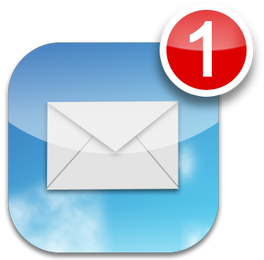 Email is great. And it’s not. It’s a tool that enables us to electronically communicate with someone on the other side of campus or the other side of the world, with just a few keystrokes and mouse click or a few taps on our phones. Unfortunately, it’s also something that can blur, if not altogether erase, the boundary lines that separate our work and personal lives. Email provides us the ability to stay connected in a way that was unheard of before its invention in 1971. It allows us to work remotely and into the evening. It means we can take care of business from our phones, all while sitting on the couch at home, in line at the grocery store, or at our son’s or daughter’s soccer practice. While there are times when we may need to answer emails away from the office, the problem exists when we let email control us, when we feel like we have to answer emails from home, in the grocery store, at our kids’ practices, or late at night. Email is a powerful tool, but it can control us if we allow it. In my position, I get a ton of email, and I used to struggle with the urge to constantly check to see if I had any new messages. For me, taking back control began with turning off notifications. Whether that was the audible bell that rang on my desktop or laptop each time a new message arrived, or notifications on the email app on my phone and iPad, I turned them off. That’s right. I turned them off. “But you’re a principal,” you might be thinking. “You can’t turn off your notifications.” Yes, I am, and yes, I can. I did it. I turned off my email notifications. And it’s been one of the most important professional decisions I’ve made, one that has substantially helped manage my level of stress and improved my mental well-being. It’s amazing how compelling that little red number in the upper, right-hand corner of the email icon can be, how much power it can possess. When I had notifications on and the red number would appear, indicating a new message had arrived, it was as if that number was whispering to me, “You’re missing something. Don’t you want to know what this new message says?” And more often than not, I gave in to the compulsion and checked my messages, even if it was late in the evening, on the weekend, or while I was spending time with my family. Email was controlling me. Notifications had erased the boundary between work time and personal time. So I turned them off. I banished this digital bully to the virtual abyss with a simple swipe in the app’s settings. Now, let me be clear. I still check my email frequently. I’m a site principal, so I am tasked with keeping the lines of communication open with stakeholders. I’m responsible for responding to email in a timely fashion, and I do. I still check my email. I check it a lot! But I check it on my schedule. If it’s an emergency or something that needs an immediate response, I can be reached by text or phone. District personnel and my school staff have my cell phone number and know not to hesitate to text or call if it’s something urgent. But if it’s an email, I’ve learned that it’ll keep until I check it. It’s important to note that this idea of taking back control is not limited to email. It extends to apps like Remind, Seesaw, ClassDojo, and text messaging. Teachers, these digital tools are fantastic ways to stay in contact with your students and their parents. But please be careful, as they too can control you if you allow them to. Just because you can respond to the message a parent sends at 10:00 p.m. doesn’t mean you should. It’s like feeding a stray cat -- if you feed it, it will keep coming back, expecting you to continue feeding it. In the same way, feeling compelled to respond to a parent’s message late in the evening, well after work hours have concluded, can lead to parents expecting a response right away...even though 10:00 p.m. is clearly outside of the time we should be expected to be working (and would expect parents to answer any of our questions). Bottom line, in my experience, I’ve found that rarely has checking my email at 10:00 p.m. contributed to a good night’s sleep. Whatever is lurking in messages sent late at night will keep until morning. My purpose in writing this post is not to imply that responding to messages in a timely fashion isn’t important. It’s incredibly important! My point is that we have to set boundaries. After work, it’s OK to set the computer, tablet, or phone aside so you can devote your full attention to family, friends, and your own well being. It’s more than OK -- it’s necessary. You can be a great teacher or administrator and still devote time for your personal life. And that’s not something to feel guilty about. If you’ve been struggling with setting boundaries in the area of email and other communication apps, consider this post permission to take back control. Remember, if it’s an emergency, whoever it is will find a way to get a hold of you right away. If not, it’ll keep until morning.
0 Comments

Dream small.
“Wait, what? Dream small?” you may be thinking. “I thought we were supposed to dream big. I thought we were were supposed to have big dreams.” We are. But we also need to dream small. Let me explain. Recently, a song I had never heard before made its way into my earbuds as a Spotify suggested tune. The song is called “Dream Small” by Josh Wilson. As I listened, the lyrics completely resonated with me, especially this second verse:
“It’s visiting the widow down the street
Or dancing on a Friday with your friend with special needs These simple moments change the world Of course there’s nothing wrong with bigger dreams Just don’t miss the minutes on your way to bigger things ‘Cause these simple moments change the world”
As I listened, it made me think of what we do in education. We have so many big goals for our students, and rightfully so. Teaching them to read and write. Helping them master the various components of mathematics. Building responsibility and character. Preparing them for college and the workforce. All important things for sure. Make no mistake, these should be our goals for our students.
But this song served as an excellent reminder that we cannot overlook the small things on the journey to our bigger goals, for it’s the little things that often times have the biggest impact. A smile. A high-five or fist bump as students enter your classroom each day. An encouraging pat on the back. An observant comment such as “I like your shoes. Are those new?” or “Did you get your hair cut?” Asking about a student’s weekend, and then giving your undivided attention as he or she tells you about it. These simple moments can change a student’s world. These simple acts can make students feel valued, feel loved, something far more important than a perfectly executed lesson. It’s so easy to get bogged down with all we have to do — the demands on teachers and administrators are great. We are responsible for a ton! But let us not forget the power contained in a smile, a compliment, or a few moments of undivided attention. Let us not forget to dream small. Even a tiny pebble can create a large ripple. Or as another verse in the song says,
“A tiny rock can make a giant fall.”

For two and a half years, I've had the absolute privilege of serving as an elementary school principal. I love my job. As I've previously written, there are tons of perks to my position. Knee-high hugs from kindergarteners. Being greeted each morning by smiling faces on students eager to learn. Working with dedicated teachers and staff who do whatever it takes to see students succeed. Connecting with students and their families. My job is awesome. I am blessed.
But can I be honest? I often feel inferior as it relates to what I do. I'm a lifelong learner. That means I like to find new ways to become better at what I do. That means I frequently dive into the pool of digital professional development known as Twitter, consistently finding inspiration and resources from members of my Professional Learning Network (PLN). That means I attend educational technology conferences and edcamps as often as I can to learn how to better leverage technology to enhance student learning. This week I had the opportunity to attend the Leadership for the Learning Symposium in San Jose. Over the course of the three days, I was inspired by Jamie Casap, Eric Sheninger, Wes Kieschnick, and others. That means I read fellow educators’ blogs and watch TED Talks on leadership and teaching, looking to be inspired, to learn something new. And you know what? I find what I’m looking for in all these places. I am consistently amazed by the #eduawesome teachers and administrators I meet at conferences, follow and interact with on Twitter, and work alongside in my district. I frequently think, "Oh my gosh! Look at the Incredible things he/she is doing with students/staff!" Unfortunately, this sometimes leads to the thought "I'm not doing that with my students/staff.” That can then lead to the thought “Someone’s going to find out and realize I’m not as good as (Person A) or (Person B)." I feel inadequate by comparison. As I was sitting in the San Jose airport waiting for my flight home, I was reflecting on the conference I had just attended. As I was reviewing my notes and tweets about the event, I started to slip into that negative line of thinking referenced above. And you know what snapped me out of it? American Idol. Wait, what? American Idol? Yep, American Idol. Let me explain. American Idol is in its final season and currently airing the audition stage of the competition, where hopeful contestants try to impress the three judges with their singing ability and earn a “ticket to Hollywood.” If you’ve been watching the show, you may have seen Melanie Tierce audition in San Francisco. Melanie is from my city of Murrieta and leads worship at my church, so it was cool to see someone I actually know on American Idol. American Idol for crying out loud! And she rocked her audition. She gave J-Lo “goosies,” brought Keith Urban to tears, and had Harry Connick tell her, “That was absolutely stunning.” If you missed her audition, you can watch it here. So back to me in the airport, starting to slip into the abyss of self-doubt. To try and clear my head, I pulled out my phone to check Facebook and came across a local news article about Melanie’s audition. In the article, Melanie was interviewed and asked about her biggest challenge trying out for the show. She responded with this:
“I didn’t know the level of talent would be so high. You constantly have to remind yourself of what you have in what you’re able to bring, and know that it is not stolen by other people having such a high caliber of talent.”
Though Melanie was referring to the talent on American Idol, her quote resonated with me. Just because there are a bunch of other talented singers on the show doesn’t diminish Melanie’s talent. The same idea is true for me. Just because others are doing incredible things in their schools doesn’t mean what I’m doing isn't good as well. Just because (Person A) rocks, that doesn’t mean I stink! Should I strive to improve as a leader? Absolutely! Should I emulate best practices and try to incorporate them in my own school? Without a doubt. But I shouldn’t do it by playing the dangerous game of “Who’s Better?” That game has no winner. I’m challenging myself to remember Melanie’s words of wisdom and not play the comparison game. If you sometimes beat yourself up in the same way, I challenge you to remember them too. We cannot let the talent/experience/skills of others rob us of what we bring to the table in our own schools. As we travel on the road to excellence, let us not lose sight of the good we are doing, the positive impact we’re making as we travel on this path. |
About BrentBrent has worked in the field of education as a teacher and administrator for 28 years. A former elementary school teacher and principal, he is currently Coordinator of Elementary Education in the Murrieta Valley Unified School District in Southern California. Read more about Brent here. Brent on X (Twitter)Archives
May 2024
Categories
All
|
Photos from somegeekintn, woodleywonderworks, Joybot, British Council Singapore, jseliger2, berkuspic, toddwendy, Alexandra E Rust, skippyjon, crdotx, tharrin, roybuloy, .FuturePresent., Just some dust, frankpierson, Jair Alcon Photography, Luigi Mengato, Muffet, stevendepolo, Pilar Soro, Sander van der Wel, jblyberg, jonathangarcia, DraXus, angeloangelo, Sthetic


 RSS Feed
RSS Feed
